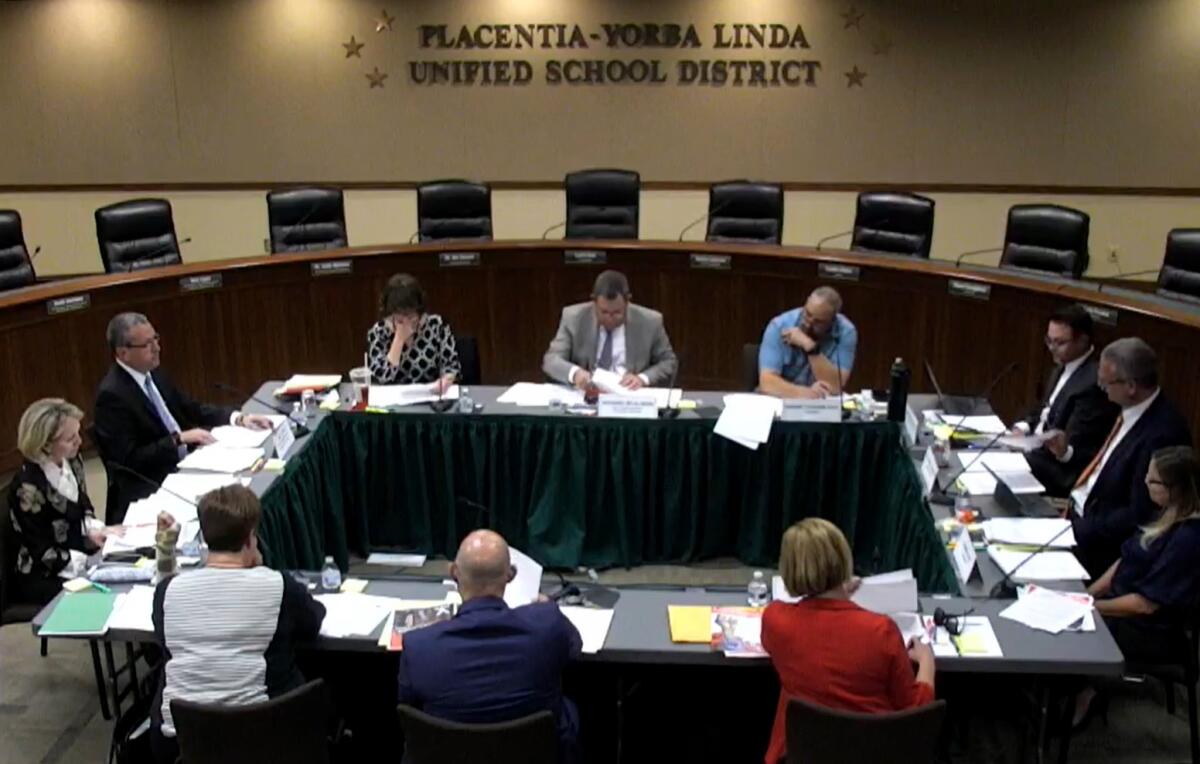Placentia-Yorba Linda school board studies proposed ‘critical race theory’ ban

How issues of American history and racism can be taught in classrooms under a ban on critical race theory became a central question for the Placentia-Yorba Linda Unified School District this week.
Trustees debated the language of a draft resolution proposing such a prohibition, especially where it concerned how critical race theory is defined and how any ban would be enforced, during a special study session.
The number of students, parents, teachers and residents who opposed the ban at the Wednesday afternoon meeting vastly outnumbered the public speakers who supported it.
“This resolution bans an irrelevant, nonsensical political boogeyman and it does so at our children’s expense,” said Josh Schroeder, a district parent. “Who does this resolution really help? It helps partisan trustees rally their base.”
Seated in the audience, opponents held signs that read “don’t whitewash our curriculum” and “students support diversity.”
But a mother of an El Dorado High School student claimed that her daughter had recently been made to feel bad about being white at school and that supporters of former President Donald Trump were on the receiving end of unfair treatment at the district.
“Our kids are already being censored, but because we are Republican Christians, we don’t get value for that,” she said. “Kids were told to take their Trump flags down in their bedrooms during Zoom. Kids were told to take off their MAGA hats.”
At the core of the controversial ban is its definition of critical race theory.
Trustees have discussed a ban since last fall. The American Historical Assn. and PEN America have since sent the district letters opposing such a move.
The NAACP Legal Defense Fund defines critical race theory as “an academic and legal framework that denotes that systemic racism is part of American society — from education and housing to employment and healthcare.”
It’s most often taught at graduate-level university courses and in law school.
Recently, allegations of its instruction at public schools have fueled failed recall bids at local school districts in Tustin and Los Alamitos.
Placentia-Yorba Linda Unified’s draft resolution offered a six-point definition claiming critical race theory is a framework that posits the United States of America as “fundamentally” or “systemically” racist.
It also defined the theory as one where a person’s race determines their moral character, casts meritocracy as “inherently racist,” and promotes intersectionality.
One sentence originally read that the theory teaches that “our race is inherently or intentionally racist,” but the word “our” was attributed to a typographically error and changed to “one’s” in the course of combing through the resolution’s language.
The definition underpinning the proposed ban prompted much debate about U.S. history from the all-white five-member school board that represents a district where 47% of students are Latino and 30.7% are white, according to statistics from the California Department of Education’s dashboard.
Trustee Marilyn Anderson made a distinction between “structural” and “systemic” racism in opposing the instruction of the latter, particularly where it concerned the nation’s founding.
“You can talk about laws that promoted racism, but you wouldn’t talk about how our country was founded on racism,” she said of future class instruction.
“Systemic racism, to me, is not at the founding core,” said board president Carrie Buck. “It’s the racism that’s within the systems that we have in the United States.”
Another exchange surrounded slavery.
Trustees Shawn Youngblood and Leandra Blades, who are in favor of the ban, claimed that Irish indentured servitude constituted slavery in colonial America.
“They weren’t slaves,” Buck rebuffed. “They were indentured servants.”
Amid the historical debates, Todd Robbins, an attorney who consults with several school districts, asked what the overall intent of the resolution was and how a teacher would face repercussions for lessons in contradiction of it.
“That’s a question for H.R.,” Anderson said.
Robbins cautioned laws that are vague have been found by the U.S. Supreme Court to be unconstitutional under the 14th Amendment. He pointed out that the district hasn’t adopted a “controversial issues” policy found at other districts and suggested that it could cover many of the concerns addressed by the resolution.
Toward the end of the study session, Anderson sought to add to the definition of critical race theory under the proposed ban, this time borrowing from the one offered by the state’s ethnic studies model curriculum, which describes it firstly as the “practice of interrogating race and racism in society.”
The proposed introduction of another definition into the resolution while keeping the six-point one only muddied the path forward in Robbins’ view.
“The six bullet points are not generally included in what the definition of CRT is that I’ve come across,” he said. “The board needs to have a better understanding of, if this gets inserted in it, how does that definition impact this resolution?”
Robbins suggested scrapping the six-point definition in the draft resolution altogether while also considering adopting a separate “controversial issues” policy.
A majority of trustees agreed before the study session adjourned.
The board is expected to bring the revised resolution banning the instruction of critical race theory back for a vote during its April 5 meeting.
All the latest on Orange County from Orange County.
Get our free TimesOC newsletter.
You may occasionally receive promotional content from the Daily Pilot.




